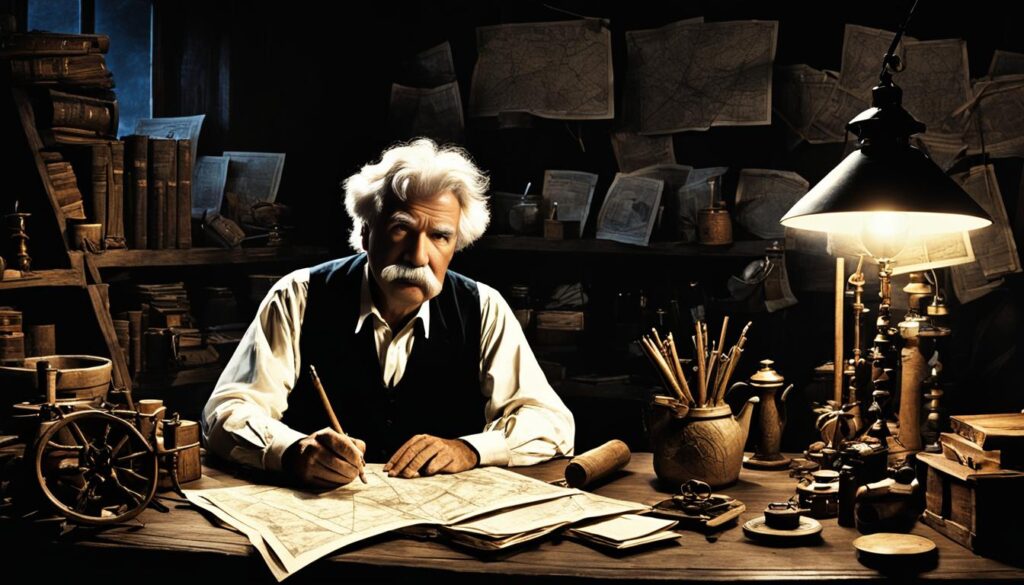If you’re a fan of classic literature and love listening to audiobooks, you won’t want to miss this review of “The Adventures of Huckleberry Finn” audiobook. Written by celebrated author Mark Twain in 1884, this timeless tale has captured the hearts of readers for generations. In this audiobook review, we’ll explore the narration and production quality, characterization, themes explored, writing style and language, historical and social commentary, critical reception, controversy, and the lasting impact of this literary masterpiece on modern literature and popular culture.
Whether you’re a die-hard Twain fan or a newcomer to his works, this audiobook is sure to captivate you with its gripping storyline, well-defined characters, and thought-provoking themes. So, let’s dive into our comprehensive “The Adventures of Huckleberry Finn” audiobook review and find out why it’s a must-listen for all book lovers.
Overview of “The Adventures of Huckleberry Finn”
“The Adventures of Huckleberry Finn” by Mark Twain is a classic novel published in 1884. The story follows Huckleberry Finn, a mischievous young boy who runs away from home and embarks on a journey down the Mississippi River with an escaped slave named Jim. Along the way, they encounter various obstacles and adversaries, including Huck’s abusive father and two con men who attempt to swindle them out of their money.
The novel is set in the pre-Civil War era and addresses themes of slavery, race relations, and morality. It is widely regarded as a masterpiece of American literature and a scathing critique of society during that time period. “The Adventures of Huckleberry Finn” is also notable for its authentic portrayal of Southern dialects and use of vernacular language.
“All modern American literature comes from one book by Mark Twain called Huckleberry Finn.”
– Ernest Hemingway
Audiobook Narration and Production Quality
Listening to an audiobook is all about the experience, and the narration and production quality play a big role in that. The audiobook adaptation of “The Adventures of Huckleberry Finn” does not disappoint in this regard. The narrator, Elijah Wood, skillfully brings the story to life with his engaging tone and vivid character portrayal. His energy and enthusiasm help to capture the listener’s attention and hold it throughout the book.
The production quality of the audiobook is also top-notch, with a clear and crisp sound that enhances the listening experience. The audio is well-balanced, and the pacing is just right, allowing the listener to fully immerse themselves in the story. The use of sound effects and music also adds to the overall quality of the production, enhancing the listener’s experience without distracting from the story itself.
This careful attention to detail in both narration and production quality makes the audiobook adaptation of “The Adventures of Huckleberry Finn” a delight to listen to, and a clear standout in the world of audiobooks.
Characterization in the Audiobook
One of the key aspects of any audiobook adaptation is the characterization and how it is portrayed through narration. In “The Adventures of Huckleberry Finn” audiobook, the narrator does an excellent job of bringing each character to life for the listeners. Mark Twain’s unique writing style and use of dialects and colloquialisms make characterization an essential element of the novel, and this is expertly captured in the audiobook.
The protagonist, Huckleberry Finn, is depicted as a young boy with a kind heart and a rebellious streak. The narrator’s rendition of his voice and mannerisms accurately captures the character’s innocence and sense of adventure. The other characters in the novel, including Jim, Tom Sawyer, and Pap, are equally well-portrayed, with distinct voices and personalities that differentiate them from one another.
The audiobook’s characterization enhances the listening experience, allowing the listeners to form a connection with the characters and become fully immersed in the story. It showcases the narrator’s skill in effectively conveying the nuances of each character, ensuring that the listener can envision them as individuals with their own unique traits and mannerisms.
Themes Explored in “The Adventures of Huckleberry Finn”
Mark Twain’s “The Adventures of Huckleberry Finn” is a novel that tackles complex and thought-provoking themes. With the use of colorful characters and vivid storytelling, Twain explores important issues such as freedom, racism, and morality.
Freedom
Throughout the novel, the theme of freedom is a recurring motif. Twain uses the river as a symbol of freedom, as Huck and Jim find solace and escape from their restrictive lives while navigating its course. Their journey down the river is a metaphor for their search for freedom, both physically and emotionally.
Racism
“The Adventures of Huckleberry Finn” also delves into the theme of racism. Throughout the story, Twain offers a scathing critique of racism and the social structures that supported it during the time of slavery. The character of Jim, a slave running away from his owner, provides a lens through which Twain explores the insidious nature of racism and the ways that it impedes both individual and societal progress.
Morality
The theme of morality is another important aspect of the novel. Huck is faced with numerous ethical dilemmas throughout the story, as he struggles to reconcile his innate sense of right and wrong with the expectations of the society around him. Through Huck’s journey, Twain questions the very nature of morality and the role that it plays in shaping human behavior.

In conclusion, “The Adventures of Huckleberry Finn” is a literary masterpiece that explores a wide range of themes and ideas. Mark Twain’s deft handling of complex issues such as freedom, racism, and morality is a testament to his skill as a writer and his enduring legacy in American literature.
Writing Style and Language
In “The Adventures of Huckleberry Finn,” Mark Twain showcased his unique writing style and mastery of language. He was able to capture the essence of the characters through their distinct dialects, making them come alive in the readers’ minds.
Twain’s writing style is characterized by his ability to use humor and satire to portray serious themes and issues. He often used colloquial language to create a realistic portrayal of the characters and their lives. He was able to create vivid imagery and descriptions through his words, making the readers feel as if they were right beside the characters on their adventures.
Twain’s writing style and use of language have made “The Adventures of Huckleberry Finn” a classic piece of American literature, still beloved by readers today.
“If you tell the truth, you don’t have to remember anything.” – Mark Twain
Historical and Social Commentary
Mark Twain’s “The Adventures of Huckleberry Finn” serves as a powerful social commentary, shedding light on the realities of slavery, racism, and societal norms prevalent in the 19th century. Twain’s use of the Mississippi River as a backdrop for the novel represents a journey towards enlightenment and freedom that Huck and Jim undertake, reflecting societal progress at the time.
The varied characters in the novel represent different facets of society, allowing Twain to critique and satirize social norms and beliefs. For example, the character of Tom offers a commentary on the conventional attitude towards adventure and heroism, while the portrayal of the Duke and the Dauphin bring to light the dangers of fraud and deception.
Twain uses the story as a vehicle to critique racial inequality and the hypocrisy of Southern society. Through Huck’s growth as a character, Twain highlights the importance of individual moral responsibility and the rejection of societal norms. In this way, “The Adventures of Huckleberry Finn” not only presents an important historical context, but also a powerful social commentary that remains relevant to this day.
Cultural Impact of “The Adventures of Huckleberry Finn”
The cultural impact of “The Adventures of Huckleberry Finn” is far-reaching and has left an indelible mark on American literature. Mark Twain’s use of vernacular language, social commentary, and vivid characterizations have influenced literary traditions for generations to come.
The novel’s themes of freedom, morality, and racism remain relevant today and have been explored in numerous works of literature and popular culture. In addition, its portrayal of the American South and its unique culture has shaped cultural perceptions of the region and its people.
The book has been translated into countless languages and has been adapted for stage, film, and television. Many writers and scholars consider it a masterpiece of American literature and an essential read for anyone interested in understanding the country’s cultural and historical landscape.
Its literary influence can be seen in the works of authors such as Ernest Hemingway, J.D. Salinger, and Toni Morrison, who have praised Twain’s pioneering style and approach. Furthermore, the novel has been the subject of academic debate and has sparked discussions about issues such as racial representation, censorship, and literary canon.
The cultural impact of “The Adventures of Huckleberry Finn” shows no signs of diminishing, as the novel continues to captivate and inspire readers and artists alike, cementing its place as one of the most significant works of American literature.
Critical Reception and Controversy
Mark Twain’s “The Adventures of Huckleberry Finn” has received both acclaim and criticism over time. The novel’s use of racial language and themes has stirred controversy and debated its literary worth. However, it remains a classic American novel that has impacted literature and culture for over a century.

“The book is interesting, but it is also offensive and outdated. Its depictions of African Americans perpetuate harmful stereotypes and contribute to systemic racism.” – Critics
“The novel is a masterpiece of American literature, with insightful social commentary and storytelling techniques that are still relevant today.” – Supporters
Despite the controversy, “The Adventures of Huckleberry Finn” has endured and is still widely read, discussed, and analyzed. Its place in literary history is cemented, and it continues to provoke and challenge readers to confront issues of race, freedom, and morality.
Comparison to Other Twain Works
Mark Twain was a prolific writer, producing numerous works that have stood the test of time. In comparison to his other works, “The Adventures of Huckleberry Finn” stands out for its unique qualities and its contributions to Twain’s literary legacy.
While many of Twain’s works, such as “The Adventures of Tom Sawyer” and “A Connecticut Yankee in King Arthur’s Court,” are also celebrated for their humor and wit, Huck Finn offers a deeper exploration of themes such as freedom and morality.
“Huck Finn is the darker of the two novels, offering a more comprehensive critique of the social systems and human nature” – Jonathan Arac, literary critic
Additionally, “The Adventures of Huckleberry Finn” showcases Twain’s mastery of character development and dialects. The nuanced portrayal of the characters sets Huck Finn apart, making it a standout among Twain’s works.
Overall, while Mark Twain left behind an impressive legacy as a writer, “The Adventures of Huckleberry Finn” remains a standout for its literary significance and impact.
Recommendations and Target Audience
Overall, “The Adventures of Huckleberry Finn” audiobook adaptation is a superb presentation of Mark Twain’s classic work. Its engaging narration, high production quality, and authentic portrayal of characters make it a must-listen for anyone interested in American literature or audiobook adaptations of classic works.
The target audience for this audiobook is broad and varied. It would especially be engaging and valuable for:
- Fans of Mark Twain and American literature.
- Listeners who appreciate audiobook adaptations of classic novels.
- Individuals interested in historical contexts and social commentary.
Our recommendation is for anyone who loves American literature, audiobooks, and classic works to listen to “The Adventures of Huckleberry Finn” audiobook adaptation. Its authentic portrayal of characters, exploration of timeless themes and critiques of society, and entertaining narration make it an excellent addition to any audiobook collection.
Impact on Modern Literature and Popular Culture
Mark Twain’s “The Adventures of Huckleberry Finn” has had a significant impact on modern literature and popular culture. The novel’s themes of freedom, racism, and morality have influenced countless works of literature and inspired new generations of storytellers.
The novel has also been the subject of controversy and criticism due to its use of racial language and themes. However, its enduring popularity and cultural significance cannot be denied.
“The storytelling techniques in ‘The Adventures of Huckleberry Finn’ have become a mainstay in modern literature, inspiring both authors and readers alike.”
The novel’s characters, especially the iconic Huckleberry Finn and Jim, continue to be referenced in popular culture. From movies to music to TV shows, their names and stories are recognizable to people worldwide.
Examples of Works Influenced by “The Adventures of Huckleberry Finn”
| Work Title | Author | Publication Date |
|---|---|---|
| The Catcher in the Rye | J.D. Salinger | 1951 |
| To Kill a Mockingbird | Harper Lee | 1960 |
| The Adventures of Augie March | Saul Bellow | 1953 |
These examples demonstrate the lasting impact and influence of “The Adventures of Huckleberry Finn” on modern literature. From the use of dialect to the critique of societal issues, Twain’s novel has left an indelible mark on the literary world.
Conclusion
In conclusion, Mark Twain’s “The Adventures of Huckleberry Finn” is a remarkable novel that has stood the test of time. The audiobook adaptation of this classic work is an excellent choice for anyone looking to experience the story in a new format. The narrator and production quality of the audiobook are impressive, and the characters are vividly brought to life through audio. Additionally, Twain’s unique writing style and use of language make this novel a masterpiece of American literature.
While “The Adventures of Huckleberry Finn” has faced controversy over the years, particularly regarding its use of racial language and themes, it remains a must-read for anyone interested in literary analysis and historical context. The novel’s examination of themes such as freedom, racism, and morality showcases Twain’s ability to critique societal issues through storytelling.
Overall, this audiobook review recommends “The Adventures of Huckleberry Finn” to a wide audience, particularly those interested in American literature, historical context, and cultural impact. The novel has had a profound influence on modern storytelling techniques and continues to be referenced in popular culture. Anyone looking for a compelling and thought-provoking listening experience should give this audiobook adaptation a chance.



